Unit 4 Topic 2 Would you like to cook with us?Section A 2023-2024学年七年级英语上册课件(仁爱版)(共39张PPT,含内嵌音频)
文档属性
| 名称 | Unit 4 Topic 2 Would you like to cook with us?Section A 2023-2024学年七年级英语上册课件(仁爱版)(共39张PPT,含内嵌音频) |
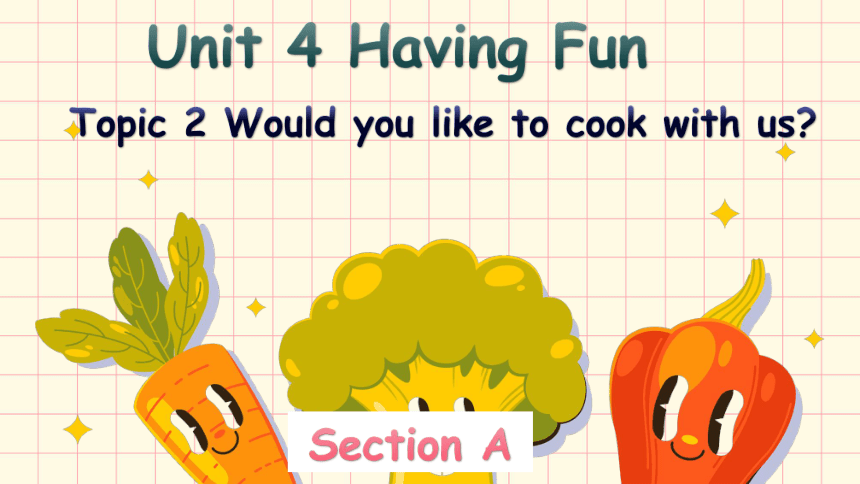
|
|
| 格式 | pptx | ||
| 文件大小 | 26.9MB | ||
| 资源类型 | 教案 | ||
| 版本资源 | 仁爱科普版 | ||
| 科目 | 英语 | ||
| 更新时间 | 2023-12-19 00:00:00 | ||
图片预览

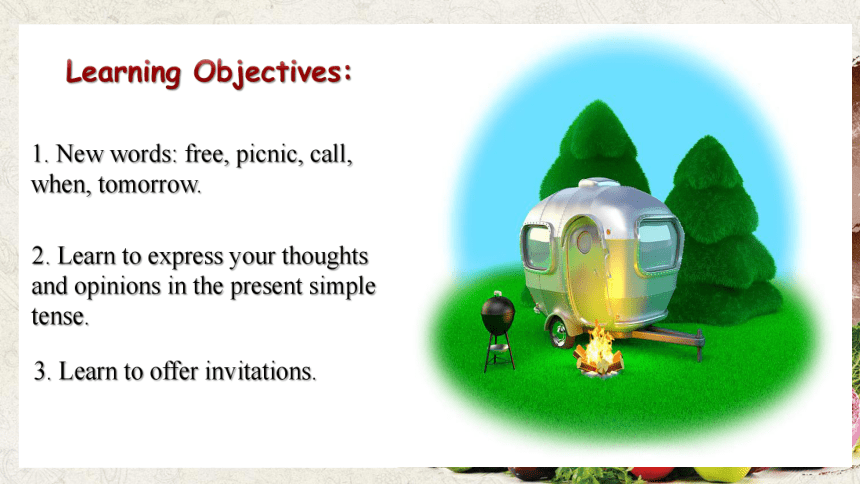
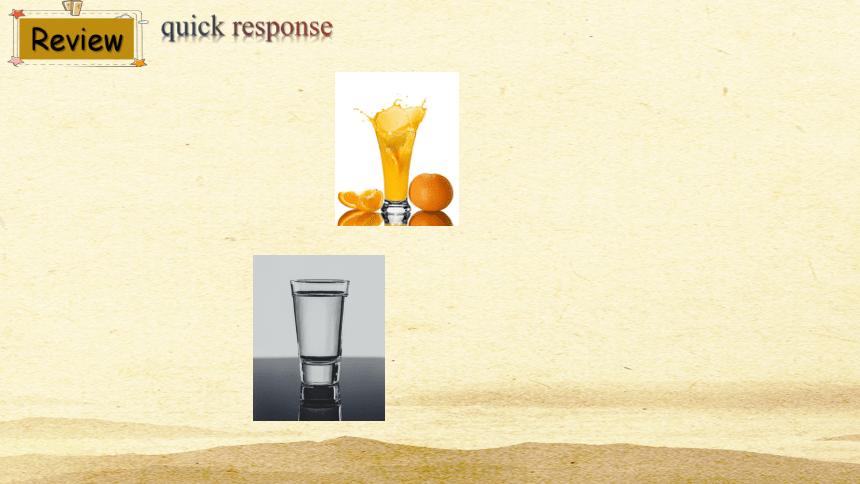
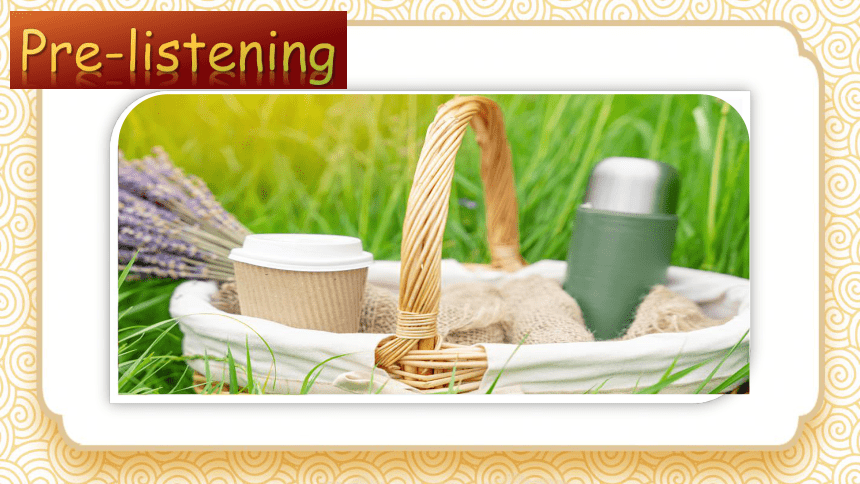
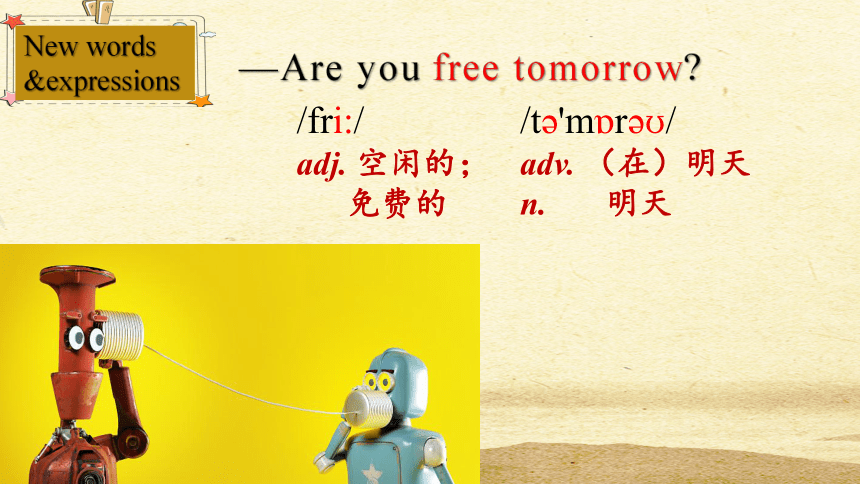
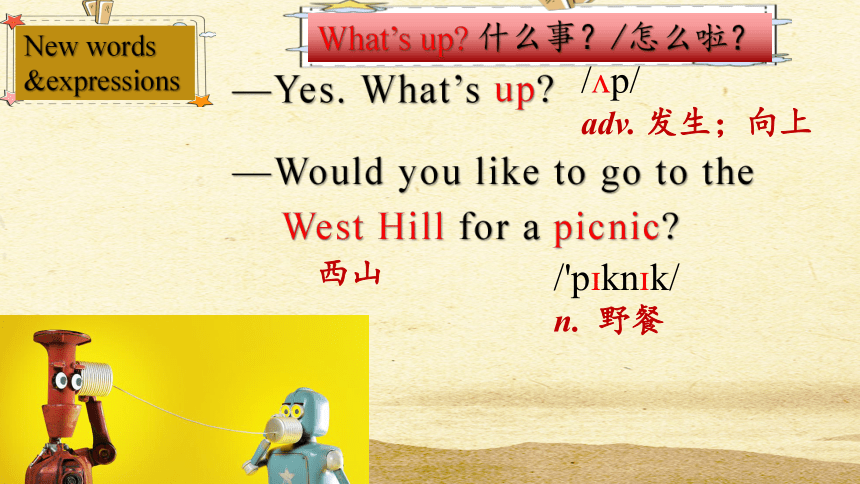
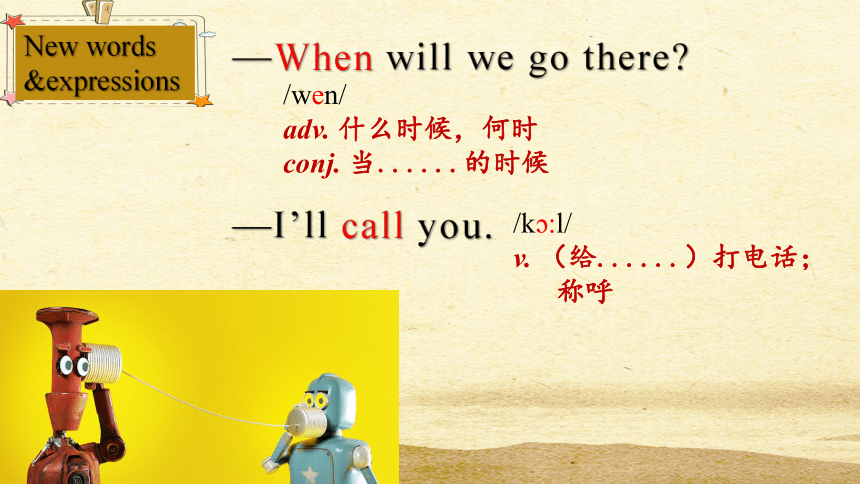
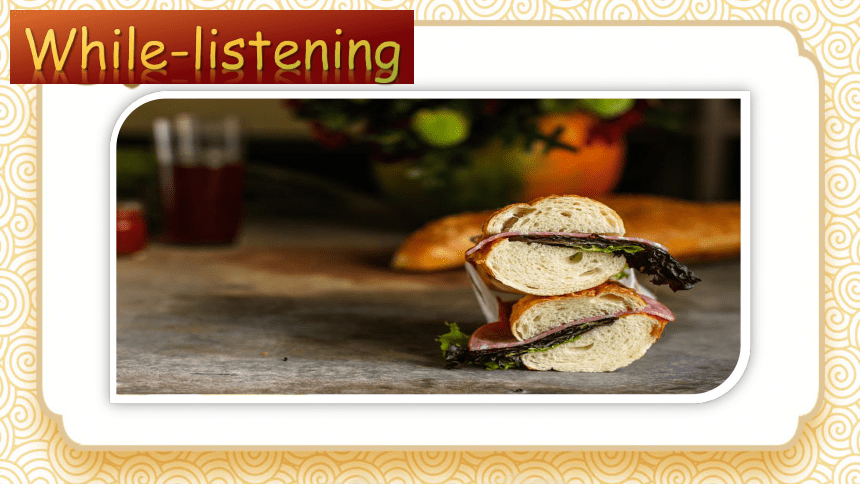
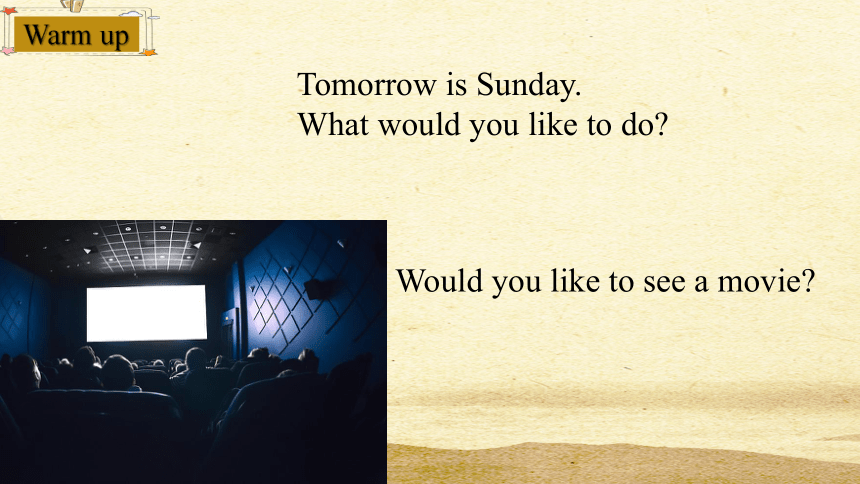
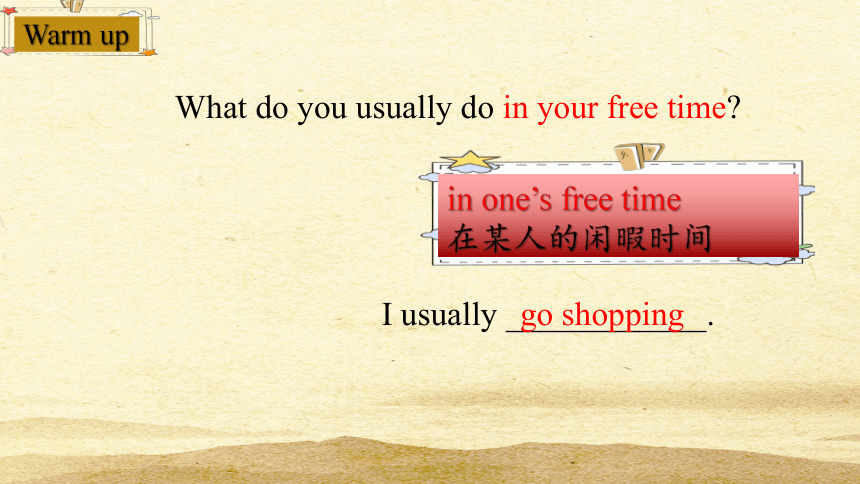
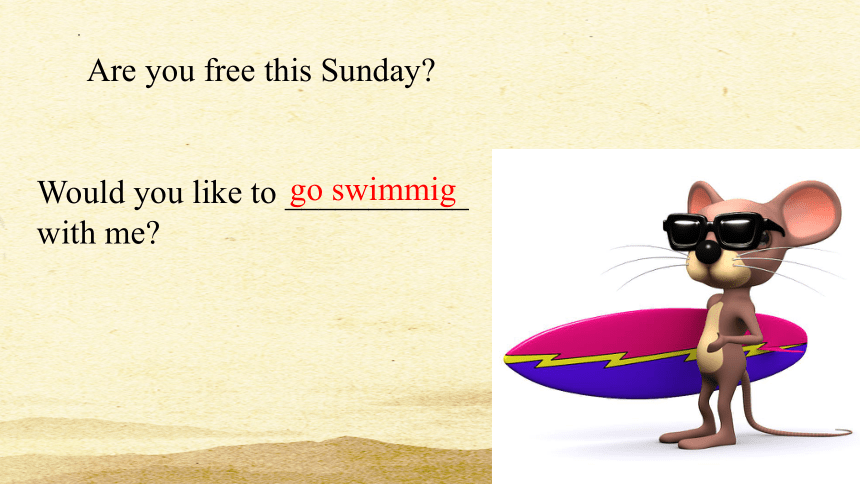
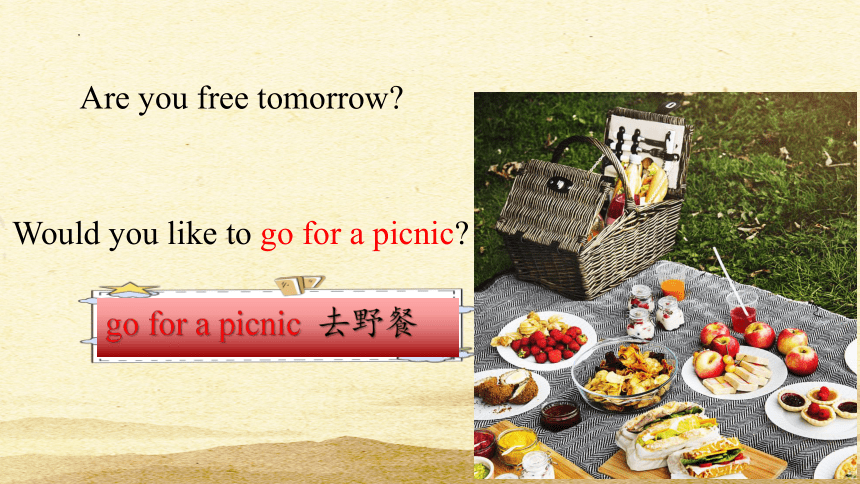
文档简介
(共39张PPT)
Unit 4 Having Fun
Topic 2 Would you like to cook with us
Section A
Learning Objectives:
1. New words: free, picnic, call, when, tomorrow.
2. Learn to express your thoughts and opinions in the present simple tense.
3. Learn to offer invitations.
quick response
Review
Pre-listening
New words
&expressions
—Are you free tomorrow
/fri:/
adj. 空闲的;
免费的
/t 'm r /
adv. (在)明天
n. 明天
New words
&expressions
—Would you like to go to the
West Hill for a picnic
/ p/
adv. 发生;向上
/'p kn k/
n. 野餐
—Yes. What’s up
西山
What’s up 什么事?/怎么啦?
New words
&expressions
—I’ll call you.
/wen/
adv. 什么时候,何时
conj. 当......的时候
/k :l/
v. (给......)打电话;
称呼
—When will we go there
While-listening
Would you like to see a movie
Tomorrow is Sunday.
What would you like to do
Warm up
What do you usually do in your free time
Warm up
I usually ____________.
go shopping
in one’s free time
在某人的闲暇时间
Would you like to ___________ with me
Are you free this Sunday
go swimmig
Would you like to go for a picnic
Are you free tomorrow
go for a picnic 去野餐
What would Kangkang like to do this Sunday
1b
Listen to 1a and fill in the blanks.
This _______ (when), Kangkang and his friends, _______ and ________ (who), will go to the ________ ________ (where) for a ________ (what).
Sunday
Jane
Maria
West
Hill
picnic
Listen again and answer these questions.
1. Who will go this Sunday
2. Where would they like to go
3. What do they want to do
Jane, Maria and Kangkang.
They would like to go to the West Hill.
They want to go for a picnic.
Watch and follow.
Jane: Hello!
Kangkang: Hello, Jane! This is Kangkang.
Jane: Hi, Kangkang!
Kangkang: Are you free this Sunday
Jane: Yes. What’s up
Kangkang: Would you like to go to the West Hill for a picnic
Jane: Oh, I’d love to.
Kangkang: Please tell Maria about it.
Jane: Sure. I’ll call her.
Kangkang: See you then.
Jane: See you.
1a
Listen, look and say.
see you then 到时候见(then“那时”)回答用:see you “再见”
Language points
1. —Hello!喂 —Hello, Jane! This is Kangkang.喂,简!我是康康。
考点:
(1)英国人接听电话的习惯是电话铃响后,拿起听筒先说 hello,并自报机构名称或私人电话号码。
eg. Hello! 722-0645. 你好!(这是)722-0645。
(2)假如接电话的人正是被找的人,可回答:
“This is ... speaking/ Speaking.”或“This is ... 意思是“我是……”。
eg. —Hello 喂
—Hello. This is Chen Jie./ This is Chen Jie speaking. 喂,我是陈杰。
【拓展】①询问对方是谁:“Who's that ”。②询问对方是不是某人时,用“Is that… ”。
eg. Is that Lily 你是莉莉吗?
Language points
2. Are you free this Sunday 这星期天你有空吗
考点:
(1) be free意为“有空的"。
be动词要随主语的不同而使用不同的形式。
eg. I am free now. 我现在有空。
Are they free tomorrow 他们明天有空吗?
Sara is not free now. 萨拉现在没空。
【拓展】free作形容词还有“免费的”意思。
eg. The food in the restaurant is free. 这个饭店的食物免费。
Language points
2. Are you free this Sunday 这星期天你有空吗
考点:
(2) Sunday意为“星期日,星期天”。星期的拼写中,从星期一到星期天的首字母都要大写,星期的复数形式表示每周的这天。
eg. It's a fine Sunday morning. 这是一个晴朗的星期天早晨。
I often go shopping on Sundays. 我常常星期天去买东西。
【注意】在星期的前面加介词on表示在星期几。
eg. on Sunday 在星期天
this Sunday这个星期天,当this后接时间词时,其前不用任何介词。
Language points
3. What's up 什么事?/怎么啦?
考点:
"What's up ” 可用 "What's the matter "来代替,常用于口语,用来询问对方有什么事情。
eg. —Hello. —Hello. This is Linda speaking. What's up
【拓展】在下面几种情况下也常使用这个句子:
(1) 询问某人在做什么。
eg. —What's your brother up 你弟弟在做什么?
—He's watching TV. 他在看电视。
(2)询问某人或某物发生了什么事,意为“怎么了 ”或“出什么事了 ”相当于“What's wrong ”或“What's the matter ”。
eg. —Kangkang isn't at school. 康康没来上学。—What's up 出了什么事
Language points
4. —Would you like to go to the West Hill for a picnic
你愿意去西山野餐吗? —Oh, I'd love to. 哦,我愿意。
考点:
(1) would like to do sth.意为“想要做某事”,相当于want to do sth.。是询问对方意见,邀请或请求某人做某事的一种委婉的表达法。通常肯定回答会用"Yes, I'd like to./I'd love to./Sure."。否定回答可用"I'd like to, but..../I'm sorry I can't.I have to..."。
eg. —Would you like to go shopping with me 愿意跟我去逛街吗?
—Yes, I'd like to./I'd love to, but I have to do my homework.
好的,我很乐意。/我很想去,但是我不得不做我的作业。
(2) go for a picnic意为“去野餐”。for在此是介词,表示目的。相当于
go out for a picnic或have a picnic. eg. Let's go for a picnic. 咱们去野餐吧。
Language points
5. Please tell Maria about it. 请告诉玛丽亚这件事。
考点:
tell sb. about sth./sb.意为“告诉某人某事/关于某人的情况”。
eg. Please tell me about your family. 请告诉我你的家庭情况。
I tell Kevin about the little boy. 我告诉了凯文关于那个小男孩的事。
【对比】tell sb. sth. /tell sth. to sb.意为“告诉某人某事/把某事告诉某人”。
eg. Tell me your name and address. 告诉我你的名字和住址。
【拓展】tell常与can, could等词连用,意为“辨别,分辨”: tell...from...
eg. Can you tell her from her twin sister
你能分出她和她的孪生妹妹吗?
Language points
6. I'll call her. 我会给她打电话。
考点:
call sb.意为“给某人打电话”,也可以说call sb. up, 这里call是动词。也可用give sb. a call,这里call是名词。
eg. Please call me tomorrow. 请你明天给我打电话。
Could you ask her to call me this evening
= Could you ask her to give me a call this evening
你叫她今天晚上给我打电话好吗?
【拓展】“call sb.+名字”意为“称呼某人为……”。
eg. We call him Mike. 我们叫他迈克。
闯关练习:
1. —_____ Jim _____ tomorrow
—I think so.
A. Is; free
B. Do; free
C. Does; free
D. Be; free
闯关练习:
2. Please _____ her _____ it.
A. tell; about
B. says; about
C. tell; of
D. speak; about
闯关练习:
3. —Would you like to go out for a picnic with us
—_____.
A. Of course not
B. That’s all right
C. I’d love to
D. Yes, I do
闯关练习:
4. —(In a telephone)Hello!
—Hello! _____.
A. I’m David
B. This is David
C. It’s David
D. That is David
Post-listening
When: _________
Where: ____________
Who: _____________________
Things: _________________
_________________
Make Kangkang’s picnic plan according to 1a.
this Sunday
the West Hill
Kangkang,Jane,Maria…
to take …
to eat …
Work in groups
3
Make a picnic plan in groups.
Picnic Plan
Time Food
Place Drinks
Other things People
Maria: Hello!
Jane: Hi, Maria! ___________________
Are you free this Sunday
Marie: Sure. __________
Jane: Would you like to go to West Hill for a picnic
Maria:____________________
Jane: See you then.
Maria: _________
This is Jane (speaking).
What’s up
Yes. / Oh, I’d love to.
Complete the following telephone conversation between Jane and Maria.
See you.
1c
Example:
(Ring …)
S1: Hello!
S2: Hello, S1. This is S2.
S1: Hi, S2.
S2: Are you free on Sunday afternoon
S1: Yes. What’s up
S2: Would you like to go to … for a picnic with me
S1: Yes, I’d like to.
S2: Please tell S3 about it.
S1: Sure. I’ll call her.
S2: See you then.
S1: See you.
打电话邀请好朋友一起去野炊吧!
Role play
Listen and mark T or F.
1. Lucy and Linda are free tomorrow. ( )
2. Lucy doesn’t want to go shopping with Linda. ( )
3. Linda wants to buy a toy car for her cousin. ( )
4. Linda and Lucy are good friends. ( )
F
T
F
T
2
4a
Listen and read the sounds and words aloud.
Letter air are augh aw a+ble a+nge
Sound /e / / :/ /e / Word air fair hair care dare share caught taught daughter draw law saw able fable table change
danger
strange
4b
Circle the letters with different sounds in each pair.
Then listen and repeat.
1. lawn dawn 2. pair fair 3. table fable
4. caught taught 5. dare hare 6. saw law
7. mouse house 8. read lead 9. sing ring
10. mail fail 11. tell bell 12. call ball
根据汉语提示写出单词,完成句子。
1. —Let’s go for a _______ (野餐) this Sunday. —Good idea!
2. Lucy is ______ (空闲的) this Sunday, so she goes shopping with her
mother.
3. —Would you like to go to the zoo ________ (明天) —Yes, I'd love to.
4. Please ______ (打电话)Jack and tell him about the picnic.
5. — ______ (何时) do you usually go shopping on weekend (周末)
— After lunch. About 3:00 p.m.
picnic
free
tomorrow
call
When
Exercises
从方框中选择适当的句子补全对话,其中有两项是多余的。
A: Hello!
B: Hello! May I speak to Tim, please
A: 1 Who’s that
B: This is Li Lin. 2
A: Yes. What’s up
B: 3 Would you like to go with us
A: Sure, I’d love to. 4
B: At 8:00.
A: OK! 5
B: See you.
D
A. We want to visit our teacher, Miss Zeng.
B. What about at school
C. Are you free tomorrow evening
D. This is Tim speaking.
E. See you then.
F. When do we meet
G. I’m sorry I can’t.
C
A
F
E
Exercises
Words:
free, up, West Hill, picnic, call, when,
tomorrow
2. Sentences:
Are you free this Sunday
Yes. What’s up
Would you like to go to the West Hill for a picnic
Oh, I’d love to.
Hello, Jane! This is Kangkang.
Summary
1. Recite the dialog in 1a.
2. Recite the new words and expressions we have learned.
3. Finish Section A in the workbook
4. Preview Section B.
Homework
Unit 4 Having Fun
Topic 2 Would you like to cook with us
Section A
Learning Objectives:
1. New words: free, picnic, call, when, tomorrow.
2. Learn to express your thoughts and opinions in the present simple tense.
3. Learn to offer invitations.
quick response
Review
Pre-listening
New words
&expressions
—Are you free tomorrow
/fri:/
adj. 空闲的;
免费的
/t 'm r /
adv. (在)明天
n. 明天
New words
&expressions
—Would you like to go to the
West Hill for a picnic
/ p/
adv. 发生;向上
/'p kn k/
n. 野餐
—Yes. What’s up
西山
What’s up 什么事?/怎么啦?
New words
&expressions
—I’ll call you.
/wen/
adv. 什么时候,何时
conj. 当......的时候
/k :l/
v. (给......)打电话;
称呼
—When will we go there
While-listening
Would you like to see a movie
Tomorrow is Sunday.
What would you like to do
Warm up
What do you usually do in your free time
Warm up
I usually ____________.
go shopping
in one’s free time
在某人的闲暇时间
Would you like to ___________ with me
Are you free this Sunday
go swimmig
Would you like to go for a picnic
Are you free tomorrow
go for a picnic 去野餐
What would Kangkang like to do this Sunday
1b
Listen to 1a and fill in the blanks.
This _______ (when), Kangkang and his friends, _______ and ________ (who), will go to the ________ ________ (where) for a ________ (what).
Sunday
Jane
Maria
West
Hill
picnic
Listen again and answer these questions.
1. Who will go this Sunday
2. Where would they like to go
3. What do they want to do
Jane, Maria and Kangkang.
They would like to go to the West Hill.
They want to go for a picnic.
Watch and follow.
Jane: Hello!
Kangkang: Hello, Jane! This is Kangkang.
Jane: Hi, Kangkang!
Kangkang: Are you free this Sunday
Jane: Yes. What’s up
Kangkang: Would you like to go to the West Hill for a picnic
Jane: Oh, I’d love to.
Kangkang: Please tell Maria about it.
Jane: Sure. I’ll call her.
Kangkang: See you then.
Jane: See you.
1a
Listen, look and say.
see you then 到时候见(then“那时”)回答用:see you “再见”
Language points
1. —Hello!喂 —Hello, Jane! This is Kangkang.喂,简!我是康康。
考点:
(1)英国人接听电话的习惯是电话铃响后,拿起听筒先说 hello,并自报机构名称或私人电话号码。
eg. Hello! 722-0645. 你好!(这是)722-0645。
(2)假如接电话的人正是被找的人,可回答:
“This is ... speaking/ Speaking.”或“This is ... 意思是“我是……”。
eg. —Hello 喂
—Hello. This is Chen Jie./ This is Chen Jie speaking. 喂,我是陈杰。
【拓展】①询问对方是谁:“Who's that ”。②询问对方是不是某人时,用“Is that… ”。
eg. Is that Lily 你是莉莉吗?
Language points
2. Are you free this Sunday 这星期天你有空吗
考点:
(1) be free意为“有空的"。
be动词要随主语的不同而使用不同的形式。
eg. I am free now. 我现在有空。
Are they free tomorrow 他们明天有空吗?
Sara is not free now. 萨拉现在没空。
【拓展】free作形容词还有“免费的”意思。
eg. The food in the restaurant is free. 这个饭店的食物免费。
Language points
2. Are you free this Sunday 这星期天你有空吗
考点:
(2) Sunday意为“星期日,星期天”。星期的拼写中,从星期一到星期天的首字母都要大写,星期的复数形式表示每周的这天。
eg. It's a fine Sunday morning. 这是一个晴朗的星期天早晨。
I often go shopping on Sundays. 我常常星期天去买东西。
【注意】在星期的前面加介词on表示在星期几。
eg. on Sunday 在星期天
this Sunday这个星期天,当this后接时间词时,其前不用任何介词。
Language points
3. What's up 什么事?/怎么啦?
考点:
"What's up ” 可用 "What's the matter "来代替,常用于口语,用来询问对方有什么事情。
eg. —Hello. —Hello. This is Linda speaking. What's up
【拓展】在下面几种情况下也常使用这个句子:
(1) 询问某人在做什么。
eg. —What's your brother up 你弟弟在做什么?
—He's watching TV. 他在看电视。
(2)询问某人或某物发生了什么事,意为“怎么了 ”或“出什么事了 ”相当于“What's wrong ”或“What's the matter ”。
eg. —Kangkang isn't at school. 康康没来上学。—What's up 出了什么事
Language points
4. —Would you like to go to the West Hill for a picnic
你愿意去西山野餐吗? —Oh, I'd love to. 哦,我愿意。
考点:
(1) would like to do sth.意为“想要做某事”,相当于want to do sth.。是询问对方意见,邀请或请求某人做某事的一种委婉的表达法。通常肯定回答会用"Yes, I'd like to./I'd love to./Sure."。否定回答可用"I'd like to, but..../I'm sorry I can't.I have to..."。
eg. —Would you like to go shopping with me 愿意跟我去逛街吗?
—Yes, I'd like to./I'd love to, but I have to do my homework.
好的,我很乐意。/我很想去,但是我不得不做我的作业。
(2) go for a picnic意为“去野餐”。for在此是介词,表示目的。相当于
go out for a picnic或have a picnic. eg. Let's go for a picnic. 咱们去野餐吧。
Language points
5. Please tell Maria about it. 请告诉玛丽亚这件事。
考点:
tell sb. about sth./sb.意为“告诉某人某事/关于某人的情况”。
eg. Please tell me about your family. 请告诉我你的家庭情况。
I tell Kevin about the little boy. 我告诉了凯文关于那个小男孩的事。
【对比】tell sb. sth. /tell sth. to sb.意为“告诉某人某事/把某事告诉某人”。
eg. Tell me your name and address. 告诉我你的名字和住址。
【拓展】tell常与can, could等词连用,意为“辨别,分辨”: tell...from...
eg. Can you tell her from her twin sister
你能分出她和她的孪生妹妹吗?
Language points
6. I'll call her. 我会给她打电话。
考点:
call sb.意为“给某人打电话”,也可以说call sb. up, 这里call是动词。也可用give sb. a call,这里call是名词。
eg. Please call me tomorrow. 请你明天给我打电话。
Could you ask her to call me this evening
= Could you ask her to give me a call this evening
你叫她今天晚上给我打电话好吗?
【拓展】“call sb.+名字”意为“称呼某人为……”。
eg. We call him Mike. 我们叫他迈克。
闯关练习:
1. —_____ Jim _____ tomorrow
—I think so.
A. Is; free
B. Do; free
C. Does; free
D. Be; free
闯关练习:
2. Please _____ her _____ it.
A. tell; about
B. says; about
C. tell; of
D. speak; about
闯关练习:
3. —Would you like to go out for a picnic with us
—_____.
A. Of course not
B. That’s all right
C. I’d love to
D. Yes, I do
闯关练习:
4. —(In a telephone)Hello!
—Hello! _____.
A. I’m David
B. This is David
C. It’s David
D. That is David
Post-listening
When: _________
Where: ____________
Who: _____________________
Things: _________________
_________________
Make Kangkang’s picnic plan according to 1a.
this Sunday
the West Hill
Kangkang,Jane,Maria…
to take …
to eat …
Work in groups
3
Make a picnic plan in groups.
Picnic Plan
Time Food
Place Drinks
Other things People
Maria: Hello!
Jane: Hi, Maria! ___________________
Are you free this Sunday
Marie: Sure. __________
Jane: Would you like to go to West Hill for a picnic
Maria:____________________
Jane: See you then.
Maria: _________
This is Jane (speaking).
What’s up
Yes. / Oh, I’d love to.
Complete the following telephone conversation between Jane and Maria.
See you.
1c
Example:
(Ring …)
S1: Hello!
S2: Hello, S1. This is S2.
S1: Hi, S2.
S2: Are you free on Sunday afternoon
S1: Yes. What’s up
S2: Would you like to go to … for a picnic with me
S1: Yes, I’d like to.
S2: Please tell S3 about it.
S1: Sure. I’ll call her.
S2: See you then.
S1: See you.
打电话邀请好朋友一起去野炊吧!
Role play
Listen and mark T or F.
1. Lucy and Linda are free tomorrow. ( )
2. Lucy doesn’t want to go shopping with Linda. ( )
3. Linda wants to buy a toy car for her cousin. ( )
4. Linda and Lucy are good friends. ( )
F
T
F
T
2
4a
Listen and read the sounds and words aloud.
Letter air are augh aw a+ble a+nge
Sound /e / / :/ /e / Word air fair hair care dare share caught taught daughter draw law saw able fable table change
danger
strange
4b
Circle the letters with different sounds in each pair.
Then listen and repeat.
1. lawn dawn 2. pair fair 3. table fable
4. caught taught 5. dare hare 6. saw law
7. mouse house 8. read lead 9. sing ring
10. mail fail 11. tell bell 12. call ball
根据汉语提示写出单词,完成句子。
1. —Let’s go for a _______ (野餐) this Sunday. —Good idea!
2. Lucy is ______ (空闲的) this Sunday, so she goes shopping with her
mother.
3. —Would you like to go to the zoo ________ (明天) —Yes, I'd love to.
4. Please ______ (打电话)Jack and tell him about the picnic.
5. — ______ (何时) do you usually go shopping on weekend (周末)
— After lunch. About 3:00 p.m.
picnic
free
tomorrow
call
When
Exercises
从方框中选择适当的句子补全对话,其中有两项是多余的。
A: Hello!
B: Hello! May I speak to Tim, please
A: 1 Who’s that
B: This is Li Lin. 2
A: Yes. What’s up
B: 3 Would you like to go with us
A: Sure, I’d love to. 4
B: At 8:00.
A: OK! 5
B: See you.
D
A. We want to visit our teacher, Miss Zeng.
B. What about at school
C. Are you free tomorrow evening
D. This is Tim speaking.
E. See you then.
F. When do we meet
G. I’m sorry I can’t.
C
A
F
E
Exercises
Words:
free, up, West Hill, picnic, call, when,
tomorrow
2. Sentences:
Are you free this Sunday
Yes. What’s up
Would you like to go to the West Hill for a picnic
Oh, I’d love to.
Hello, Jane! This is Kangkang.
Summary
1. Recite the dialog in 1a.
2. Recite the new words and expressions we have learned.
3. Finish Section A in the workbook
4. Preview Section B.
Homework
同课章节目录
- Unit 1 Making new friends
- Topic 1 Welcome to China!
- Topic 2 Where are you from?
- Topic 3 How old are you?
- Unit 2 Looking different
- Topic 1 I have a small nose
- Topic 2 What does she look like?
- Topic 3 Whose jacket is this?
- Unit 3 Getting togethe
- Topic 1 Does he speak Chinese?
- Topic 2 What do your parents do?
- Topic 3 What would you like to drink?
- Unit 4 Having fun
- Topic 1 What can I do for you?
- Topic 2 Would you like to cook with us?
- Topic 3 What time is it now?
